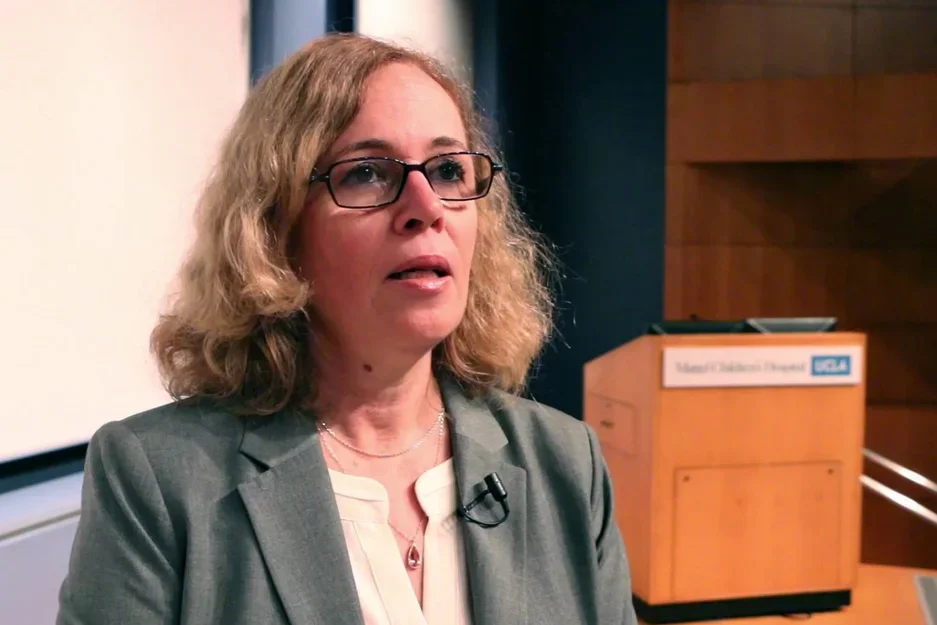International Public Health
How Can We Prevent And Treat Infectious Diseases Around The World To Improve Public Health?

Karin Nielsen, MD, MPH
Professor, Pediatrics, Division of Infectious Diseases, David Geffen School of Medicine at UCLA
Director, UCLA Center for Brazilian Studies
International Public Health
Dr. Karin Nielsen’s international collaborations and evidence-based protocols have enabled at-risk countries to mobilize life-saving public health responses to devastating infectious diseases. Her work helps vulnerable areas build practical response infrastructures they can use to fight a variety of diseases.
Dr. Nielsen’s team isolated the most effective regimen for preventing the mother-to-child transmission of HIV. Her studies established that women infected with Zika during any trimester of pregnancy could have babies with a range of devastating birth defects. This news shook the medical community and led to heightened Zika education and prevention.
International Partnerships Make Progress Against Infectious Diseases
Dr. Nielsen works with experts across disciplines to establish protocols that save lives and improve public health in a range of locations. She works with UCLA Saphir, the HIV Prevention Trials Network, the AIDS Clinical Trials Group, the International Maternal Pediatric Adolescent AIDS Clinical Trials Network, and more.
These partnerships have achieved inspiring progress on HIV and Zika by reaching patients with interventions at all phases of the infection continuum, from early prevention to long-term care.
Halting the Transmission of HIV from Mother to Child
After leading several studies to advance the diagnosis and treatment of HIV, Dr. Nielsen worked on a trial that isolated a highly effective treatment for stopping the mother-to-child transmission of HIV during pregnancy and immediately after. Read more in Benefits and Risks of Antiretroviral Therapy for Perinatal HIV Prevention, published in the New England Journal of Medicine.
Recently, the team discovered a surprising association between cytomegalovirus (CMV) infections and increased risk of mother-to-child HIV transmission. The study provides compelling evidence that CMV control and testing should be included in HIV prevention strategies.
Preventing the Transmission of HIV Between Adult Sexual Partners
Dr. Nielsen co-chaired a study establishing that antiretroviral therapy prevents the transmission of HIV from a positive sexual partner to negative sexual partner. Read more in Antiretroviral Therapy for the Prevention of HIV-1 Transmission, published in the New England Journal of Medicine.
Advancing Understanding and Prevention of Zika
Dr. Nielsen’s team was the first to conclude that a Zika infection during all stages of pregnancy could lead to birth defects, such as microcephaly. Read more in Zika Virus and Birth Defects — Reviewing the Evidence for Causality, published in the New England Journal of Medicine.
These studies made Zika a household name and excited a global public health response focused on vector control and improved diagnostics in high-risk areas. Knowing that Zika could be more devastating that we ever realized, Dr. Nielsen hopes to develop interventions by answering the following questions:
- Do vaccine antibodies provide lifelong immunity?
- Could passive antibodies prevent the spread and development of infection?
- Can we base interventions on existing vaccines for other flaviviruses, including yellow fever, dengue fever, and Japanese encephalitis?
- What factors influence whether an infected mother will have an affected baby?
Dr. Nielsen is involved in a National Institutes of Health grant that aims to secure the information needed to develop a Zika vaccine.
Fighting Infectious Diseases in the Future
Dr. Nielsen believes we can heal even more patients not only by conducting cutting-edge medical research but also by developing public health tools and networks that help the international medical community leverage emerging findings to benefit as many patients in need in as many locations as possible.